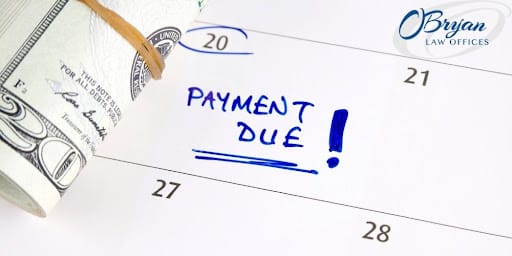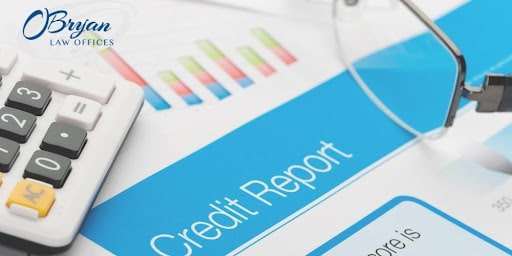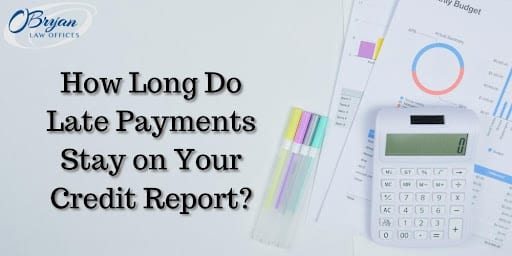Table of Contents
Even though credit reports and credit scores are just over 30 years old, they have a significant impact on many aspects of your life. Credit scores affect renting a house, buying a house, buying a car, student loans, personal loans, and even employment opportunities. Payment history accounts for a significant portion of your credit score. You may wonder why late payments have such a significant impact on your credit report and for how long. How long do late payments stay on credit report filings?
Late or missed payments stay on your credit report for up to seven years. On-time payments tell your lenders that you are a responsible lender who pays their bills on time. Unfortunately, life can get in the way and cause late payments. Late and missed payments can have an extremely negative impact on your credit report.
The Kentucky and Indiana credit counseling attorneys at O’Bryan Law Offices can help answer any questions you may have. We’ll answer some of the most common questions about late payments and how to remove them from your credit file. If this blog doesn’t answer all your questions, check out our other blog posts or give us a call at (502) 400-4020. Set up a free consultation today!
What Is Considered a Late Payment?

Every lender has its own rules and processes for late payments, which can be frustrating. Your mortgage lender may allow a three-day grace period for late payments before reporting a late payment to the three major credit bureaus. But your credit card issuer may report late credit card payments after the payment is 30 days past due. Typically, a payment is late if it’s past the due date.
When Does the Timeline Start?
The timeline for a late payment begins on the day of the original delinquency date. For example, if your credit card bill was due in April 2020 and you paid it in May, the late payment falls off in April of 2026. If you neglected to pay in April, May, and June but got caught up in July, the late payments would still fall off in April 2026.
How Do Late Payments Affect Credit Reports?

Late payments are a negative mark on your credit report. Multiple late payments and long late payments affect your credit more than a single, quickly resolved payment will. Late payments on your credit history tell lenders that you are risky. Mortgage lenders often see this behavior as irresponsible and may increase interest rates or deny lending to you entirely. Credit card issuers may reduce your credit limit, which in turn affects your score as well.
How Does Payment History Factor Into My Credit Score?
35% of your credit score depends on your payment history. Delinquent accounts have a significant negative impact on your credit score when they are initially reported. The impact lessens over time, but most late payments stay on your account for seven years.
How Can I Minimize The Consequences of a Late Payment?

Unfortunately, there isn’t much that can be done to lessen the impact of late payments. The impact on your score will lessen over time, but it may be a full seven years before late payments fall off and your score completely recovers.
The only way to minimize the impact of a legitimate late payment is to give it time and take steps to keep your account current in the future. For incorrect late payments listed on your credit profile, you can dispute errors with the credit bureau.
Can Late Payments be Removed From My Credit Report?
If late payments are inaccurate, you can take steps to remove the incorrect information from your credit report. If the debt is legitimate, it will be more difficult to remove the debt, but not impossible. Check out the tips below for removing a late payment from your credit report. If there is no way to remove the delinquent payment, you can take steps in the future to prevent another delinquency.
Credit Dispute
Lenders can make mistakes, and so can the credit bureaus. If you notice any inaccuracies with the payment history on your credit report, you can dispute the payment. If the credit bureau cannot verify the debt, they have to take it off your credit report. You can also contact your lender to see if they have the same information listed.
Letter of Goodwill
A letter of goodwill is simply a letter that you can write to your lender. The letter explains why you missed a payment and that it is an unusual circumstance that won’t happen again. A goodwill letter can be written after a natural disaster, sudden death, or extended illness. This is always an option, but it is never guaranteed to work. If you have exemplary credit history and fell behind on payments due to unusual circumstances, your lender may be able to work out a payment plan without reporting the late or missed payments to the credit bureaus.
Negotiate
Your lender may be open to negotiating the debt with you–just make sure to get any agreement in writing. You may be able to pay the debt in full or set up a payment plan in exchange for them removing the late or missed payment.
How to Avoid Late Payments

Avoiding late payments can be a tricky situation. Most people don’t have just one bill they pay every month. Juggling bill due dates and amounts can be stressful, and bills can slip through the cracks easily. Try some of the tips below to avoid late payments on your credit accounts.
Check Your Credit Score Regularly
Check your credit score regularly to catch any abnormalities. The sooner you catch an issue, the easier it is to fix. The attorneys at O’Bryan Law Offices can even help you get a free credit report and explore your credit options.
Use a Bill Calendar
A bill calendar can help provide a visual representation of your money. You may realize that the reason you have issues paying a certain bill is that the majority of your bills are due the first week of the month. Having this representation can allow you to plan better and keep on top of your payment history.
Set Up Auto-Pay or Payment Reminders
Auto-pay can be a lifesaver. Many companies offer discounts if you set up an automatic payment to go through each month. Automatic payments can prevent exorbitant late fees and keep your payments on time every time. If your account doesn’t offer autopay, set payment reminders on your phone or calendar to remind you to pay the bill a week before it’s due. Credit card companies often allow you to set the due date or change existing due dates to a more convenient date.
Call the Kentucky Credit Counseling Attorneys at O’Bryan Law Offices Today
At O’Bryan Law Offices, our attorneys can help you with every aspect of your personal finances. We can even help you get a free credit score and go over the details of your credit report to see where you can improve. We know how important it is to make financial progress, which is why our attorneys do everything they can to help you. Call us today at (502) 400-4020 to speak with a board-certified attorney at O’Bryan Law Offices.







